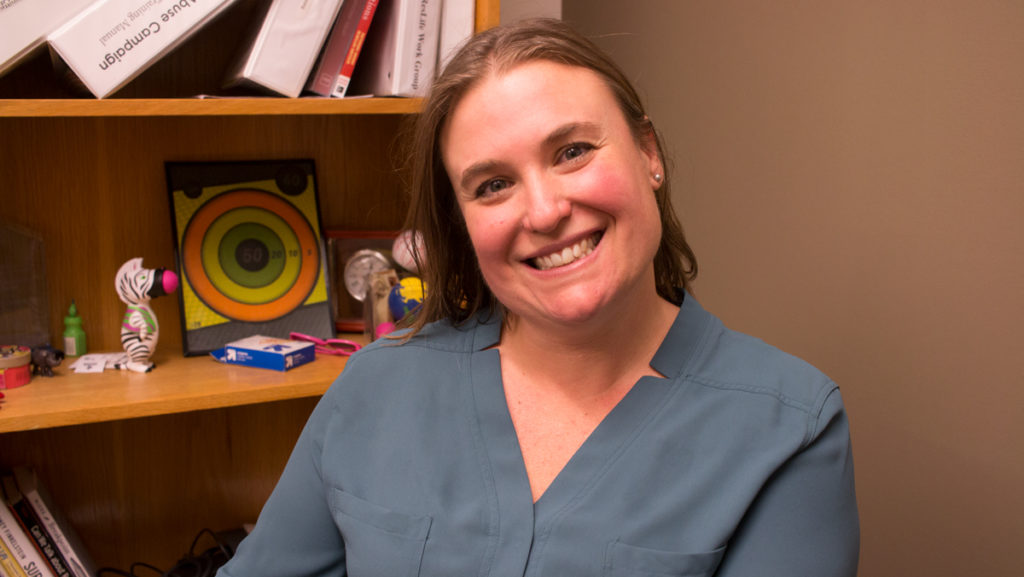Linda Koenig began her position as Ithaca College’s new Title IX Coordinator last fall. Before taking this position, she held three different positions in the Office of Residential Life: residence director, area coordinator and the assistant director for housing services and communications. She also served as the deputy Title IX Coordinator for two years.
Senior writer Ana Borruto sat down with Koenig to discuss her first semester in this role, her future goals as Title IX Coordinator and her thoughts on the #MeToo movement.
Ana Borruto: How was your first semester as the new Title IX Coordinator?
Linda Koenig: I would say it was productive. One of the things I feel the happiest about is that I think I was able to make a lot of connections with students and student groups. Students approached me about creating an IC One Love chapter, an organization that educates people about dating violence and signs of dating violence, which is super important. I was able to develop some really strong relationships with the Advocacy Center. One of the things I can do for a student is that if they feel there is a service they want to use, I can call a person and that person will reach out to that individual. There is all this internal support here at IC and externally off campus too. People care about sexual assault prevention and awareness, and that’s just awesome that people want to have a dialogue about it.
AB: What are some of your goals?
LK: Continuing to find ways to create a culture around people feeling empowered to report any incident of sexual misconduct. We needed to pick some way to describe what our policies are. If you look at the SHARE website, under sexual misconduct, it’s inclusive of dating violence, sexual assault, rape, abuse … that’s how we encompass it all into one. I am looking forward to creating some program opportunities. We’re hopefully trying to do a program called “Bringing in the Bystander,” which is a trainer-type program. We would train students … about effective techniques for intervening. There is a programming board that we created and Maggie Wetter is chairing, so hopefully there will be some great events that my office in conjunction with that committee will put on in April.
AB: What does this position mean to you?
LK: I feel this position is important and impactful. I feel like the work I do everyday directly impacts our students, staff and faculty. I feel a responsibility to our community and not only for supporting, but in engaging them in the conversation, so that we all see this as our job to keep our community safe, and it’s our job to have these conversations that are difficult, and to stop making sexual violence taboo. We have to talk about it, and that’s the only way we are going to change the culture.
AB: What are your thoughts on the #MeToo movement?
LK: #MeToo, online modules, publications, videos, anything that gets people talking and thinking about sexual violence are great. I hope that people take from them what is important. I think it helps people be like ‘that thing that was bothering me for a long time and I didn’t understand what that was, now I have words and vocabulary, and I know I’m not alone.’
AB: Why is it important to emphasize this movement on college campuses?
LK: As a Title IX Coordinator, I wouldn’t emphasize any one thing. I would say to people ‘here are all the ways you can engage around this and pick the one that is important to you.’ It’s important to have a diverse array of venues and services that are available to people.
AB: Why should education be part of the #MeToo conversation?
LK: It’s embedded in our society. We need to be able to understand our own culture in order to be able to function in it well and to continue making strides forward. Engaging in this intellectually and separating out “this is a personal issue” or “this is how I personally connect to something”… to kind of look at it from a systemic point of view. Sexual violence has existed in our culture for a long time and there are a lot of things you can point to. How we’re raised to not recognize rape culture. There are lots of things we get taught as little kids that makes us think that it is okay for someone to whistle at somebody, someone to catcall at somebody, to touch somebody without permission, because we’re socialized in that way. Some of those small things … are contributing to people feeling that it is normal to be stigmatized in a sexual way, and it’s not … so we have to learn how to step up and speak out against it. Not in a way that is accusatory or demeaning to people, but in a way that comes from an educational and caring place.
AB: How is the campus continuing the conversation of sexual assault and harassment?
LK: I’m hoping through educational events. We’re hoping to put out a video that depicts sexual assault and violence through a gay male’s perspective. I’m hoping to do some programming around consent: how do you get consent, and how do you ask for consent and how do you make that not weird or awkward in a relationship. Getting into classrooms … is really great. I get invited a lot to the First Year Seminars, and I’ll come in and do something around bystander intervention, or I’ve gone in and talked with athletic trainers about their experiences … The One Love effort on campus has been really significant in athletics, and I think really impactful, and I’m hoping that starts to extend to our larger community.








